|
|
|
Sort Order |
|
|
|
Items / Page
|
|
|
|
|
|
|
| Srl | Item |
| 1 |
ID:
134094
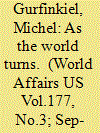

|
|
|
|
|
| Publication |
2014.
|
| Summary/Abstract |
It has been assumed, since the end of the Cold War, that globalization is irreversible and that technologies, cultures, and markets are spreading, merging, and interacting at an ever quicker pace. This is certainly true. But what if, in addition to globalizing, the world is also splitting into separate and antagonistic sub-worlds? Two of them in particular, which ironically came into existence and have been growing as free riders in the Western-shaped universe, now pose a threat to the West.
|
|
|
|
|
|
|
|
|
|
|
|
|
|
|
|
| 2 |
ID:
127778
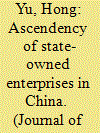

|
|
|
|
|
| Publication |
2014.
|
| Summary/Abstract |
The state sector still plays an important role in China's economy. One of the key development phenomena characterizing the Chinese economy is the rapid ascendency of state-owned enterprises (SOEs) and the resurgence of the state. The strength of China's SOEs is projected in the centrally administrated state-owned enterprises (CSOEs). They are the backbone of the national economy, spearheading national economic development and Beijing's 'going-out' strategy. The CSOEs have expanded their reach and increased their power, domestically and globally. In seeking to boost local GDP growth, the eastern provinces in China have joined the western provinces in a fierce contest to attract investment from SOEs. Nevertheless, the rapid ascendency of the SOEs has brought many negative consequences for China's economic, social and political development by causing conflict with the market-oriented development direction of Chinese economic reform and hindering fair competition between state-owned and non-state-owned enterprises.
|
|
|
|
|
|
|
|
|
|
|
|
|
|
|
|
| 3 |
ID:
128140
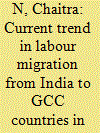

|
|
|
|
|
| Publication |
2014.
|
| Summary/Abstract |
Migration and movement of human population have always been an integral element in the history of mankind. India has been experiencing large-scale migration to foreign countries since centuries and in the current globalised era. The International Labour Organization - ILO has classified international migration for employment in to two major categories including settlement migration and contract migration (ILO, 1989). The contract migration is unique phenomenon practiced in few western countries but in particular in the GCC countries post oil boon during 1970's as the governments used sharply higher oil revenue to build infrastructure and housing, and expand the economy (Seccombe, 1985).
|
|
|
|
|
|
|
|
|
|
|
|
|
|
|
|
| 4 |
ID:
128860
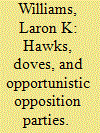

|
|
|
|
|
| Publication |
2014.
|
| Summary/Abstract |
Parliamentary regimes offer the unique opportunity for opposition parties to react to foreign policy by proposing no-confidence motions (NCMs). The threat of an NCM bringing down the government may be enough to induce pacific behavior by the executive. Yet, this simplistic characterization neglects the possible electoral motivations of opportunistic opposition parties. I develop a theory that opposition parties respond to involvement in international conflict by proposing NCMs as a tool to influence voters' opinions with an eye toward the next election. I develop two expectations based on policy disagreement and issue ownership that I use to explain the electorally motivated decision to propose NCMs following conflict. I test these expectations with a dataset of 14 European parliamentary democracies from 1970 to 2001. The empirical evidence suggests that the partisanship of both the government and opposition parties interact to create varying electoral incentives to propose NCMs based on issue ownership. Right-wing opposition parties are more likely to challenge than left-wing parties, and this effect is exacerbated when facing left-wing governments. This study has important implications that underpin a number of theories of the domestic causes of international conflict as well as implications for the study of party strategy.
|
|
|
|
|
|
|
|
|
|
|
|
|
|
|
|
| 5 |
ID:
130827
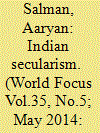

|
|
|
|
|
| Publication |
2014.
|
| Summary/Abstract |
"I believe in a religion based on universal and all-embracing principles which have always been accepted as true by mankind - the primeval eternal an religion, which means that it is above the hostility of all human an creels whatsoever. " - -Swami Dayananda Saraswati. There can be little debate on the In?uence of co Religion on Human History. The overwhelming impact of Christianity, Hinduism, Zoroastrianism, Judaism, or Islam on Civilization is seen not only in the cultural pl: semblance and value system which emerge from their - D2 teachings, but also re?ects in the effects they've had Ul on mankind. un an Believers and Unbelievers alike have acknowledged the profound in?uence of religion on ha individuals, societies and on humanity's collective life. the Religion was and is a power that's here to stay with above both the western and eastern hemispheres! that will On the other hand, Religion was and is still the considered a pariah' by Western Secularism! According are to historian R. Scott Appleby "Religion, at last, can no be longer be ignored". This was one of ?ve "unintended, unforeseen" consequences of 9/ l 1. HI In present day, challenges are manifold both co at domestic and at international level. Most political of con?icts end up passing through the prism of religion» pr. or ethnicity and are claimed to be the trigger factor in cl: many con?icts. The relationship between Religion and special Con?ict is complex.3'And Religion is at the heart of the Secularism Debate as Ethnicity and Religion have been an the building blocks of an lndividua1's Identity. Appleby hi: de?ned religion as 'the human response to a reality m: perceived as sacred
|
|
|
|
|
|
|
|
|
|
|
|
|
|
|
|
| 6 |
ID:
132214
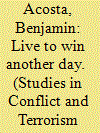

|
|
|
|
|
| Publication |
2014.
|
| Summary/Abstract |
Militant organizations pursue two common aims: to survive and to achieve the goals that define their raison d'être. Yet, elements that sustain the life spans of militant organizations are not necessarily the same components that advance the accomplishment of their core, or "outcome," goals. Further, some organizational practices, such as the use of suicide attacks, generate a tradeoff that bolsters survivability while detracting from the effective pursuit of outcome goals. This study demonstrates that three operating conditions explain variation in the duration and achievement of contemporary militant organizations: receptiveness to tradeoffs, levels of external support, and the nature of adversaries. As such, the unique effects of different operating conditions reveal why many militant organizations survive for long periods of time but only a few achieve the goals that justify their existence.
|
|
|
|
|
|
|
|
|
|
|
|
|
|
|
|
| 7 |
ID:
124496
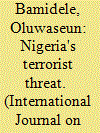

|
|
|
|
|
| Publication |
2013.
|
| Summary/Abstract |
The most immediate threat to the security of Nigeria is the Islamist insurgency raging in its north east region. Deadly attacks have killed a large number of people, devastated infrastructure, and hindered military success in this region and beyond. High ranking members of Al-Qaida may have been harbored, and the insurgents are affiliated with various militant sects, who pose a threat to wider sub Saharan Africa, especially Nigeria.
|
|
|
|
|
|
|
|
|
|
|
|
|
|
|
|
| 8 |
ID:
131653
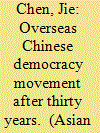

|
|
|
|
|
| Publication |
2014.
|
| Summary/Abstract |
The overseas Chinese democracy movement, sustained by exiled Chinese dissidents in the West, has just reached its 30th anniversary. Despite a widely held view that it has declined and failed irrevocably from its moral and political height during the first half of the 1990s, new trends have emerged.
|
|
|
|
|
|
|
|
|
|
|
|
|
|
|
|
| 9 |
ID:
130936
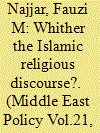

|
|
|
|
|
| Publication |
2014.
|
| Summary/Abstract |
For more than two centuries, Muslims have been struggling to cope with the challenges of the scientific, technological, political and cultural civilization of the West. Modernization has been thrust upon them by colonialism as well as by globalization in general. To modernize has been somewhat inescapable. The more pressing question agitating the Muslim mind has been how to modernize and remain Muslim, as Muhammad Abdou, a leading Egyptian modernist, put it more than a century ago.
|
|
|
|
|
|
|
|
|
|
|
|
|
|
|
|
| 10 |
ID:
131348
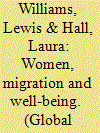

|
|
|
|
|
| Publication |
2014.
|
| Summary/Abstract |
Today, the less desirable fruits of the Western growth paradigm are readily apparent as we are confronted with significant threats to our collective well-being. Such threats include: environmental degradation, increasing health, wealth and power disparities, forced migrations and on-going violent conflicts between groups. These problems have been recognized as interrelated with the same root cause: the almost total dominance of the particular assumptions, worldview and social practices of the modern paradigm.2 Correspondingly, it is increasingly argued that human security and well-being are closely connected to linking social and ecological resilience through the re-integration of onto-epistemologies3 of deep interconnectedness into human progress and well-being narratives, worldviews closely associated with Indigenous and other traditional peoples.4 Paradoxically, it is these same peoples, particularly impoverished women and children, who have often borne the brunt of the modernist development paradigm. Whether through inter-racial and ethnic conflict, or for environmental or economic reasons, these seemingly disparate communities are often similarly positioned at the margins of society as a result of forced migration, ensuing cultural dislocation and resulting psycho-spiritual distress.
|
|
|
|
|
|
|
|
|
|
|
|
|
|
|
|
|
|
|
|
|